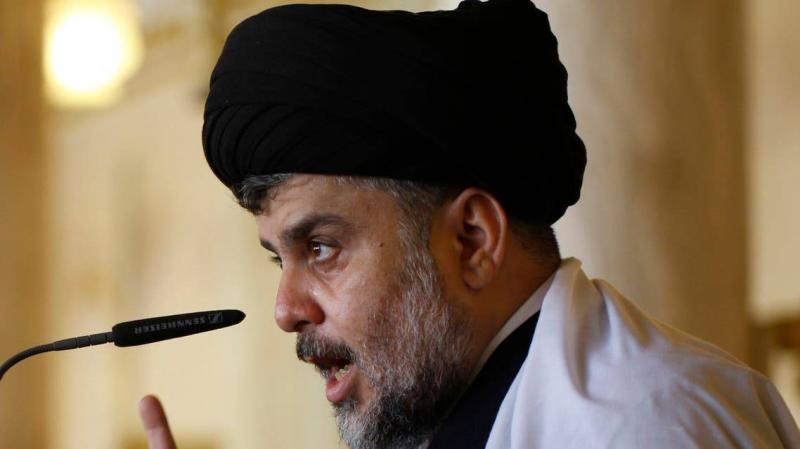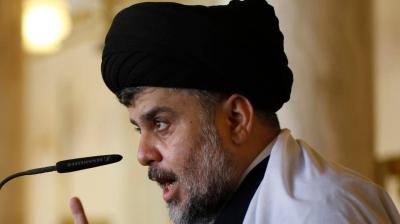"I will not participate in these elections; the nation is more important than all of that," declared the leader of the Sadr Movement, Muqtada al-Sadr, in a televised address last July, adding, "I announce my withdrawal from all affiliated with this current and future government, even if they claim affiliation with us, al-Sadr." Sadr's position surprised many and came just days after a fire broke out at the Al-Hussein Hospital in Nasiriyah, leading to at least 60 deaths. This incident sparked widespread public outrage due to the deterioration of healthcare services in Iraq. Reuters reported that researcher Hamdi Malik from the Washington Institute considered Sadr's announcement as seemingly a way to distance himself from public discontent over hospital fires and power and water outages that ignited protests. He anticipated that Sadr's party would participate and achieve good results in the elections, despite Sadr's personal non-candidacy.
**Exploiting Withdrawal!**
The results of the Iraqi parliamentary elections held in October confirmed Hamdi Malik's analysis, as the Sadr Movement won 73 seats according to preliminary results announced by the Independent High Electoral Commission. These figures exceeded their results from the 2018 elections when the Sa'irun Alliance won 54 seats. Ammar al-Hakim, leader of the National Wisdom Movement, had tweeted on July 16, urging Muqtada Sadr to return to political life, saying, "We urge our brother, His Eminence Mr. Muqtada Sadr, to reconsider his decision to withdraw from the elections and to continue the joint national effort, without leaving the field to an important public pole. We affirm that maintaining democratic practice and not retreating from it is the only way to address failures and ensure justice for the people aspiring to obtain their rights." It was surprising that Hakim, who engaged in political work via a "national" approach, distancing himself from sectarian classifications and religious rhetoric, faced an unexpected loss in the recent elections, while Sadr, having withdrawn, emerged as the biggest winner.
Neither Ammar al-Hakim was alone in urging Muqtada Sadr to engage in "parliamentary elections," as Iraqi Prime Minister Mustafa al-Kadhimi emphasized on his Twitter account that "the Sadr Movement is an important segment of society, and it is unimaginable not to participate in the elections; Iraq is a trust in everyone's hands." The modest results achieved by the "Fateh Alliance" and the strong rise of the "Sadr Movement" will make the latter a crucial player in forming the next Iraqi government. It is expected that the Sadrists will ally with the "Progress" bloc and the "Kurdish Democratic Party," and some independent deputies and those associated with the "October Youth Movement" might also join, even though the "October movement" views Sadr and others as part of the ruling political class that brought Iraq to its current "deteriorated" condition. However, after the victory of several of their deputies, they might pursue political realism and lighten their "revolutionary dreams."
**Reasons for the Rise?**
The rise of the "Sadr Movement" can be viewed as the result of widespread disinterest in the elections from various sectors of Iraqis, leading to weak participation from many, contrasted with a significant presence of "Sadrists," who are characterized by their "obedience to their leader, Mr. Muqtada Sadr," and the mobilization capacity of his organizational base, especially in cities and provinces suffering from poverty and poor services. However, surprisingly, the "Sadrists" also achieved successes in provinces like Najaf, home to the "Hawza" (religious authority), which is not considered a strategic depth for Muqtada Sadr; on the contrary, there is widespread public opinion critical of Sadr's discourse and political stances there.
Muqtada Sadr also benefited from his political positioning, presenting himself as an "Iraqi Arab," concerned with the independence of Iraqi decision-making from external influences. He distanced himself from the "Iranian axis" without opposing it, and at the same time opened up, albeit partially, to the Gulf states, visiting key capitals such as Riyadh and Abu Dhabi. This political stance aligned significantly with the approaches of Mustafa al-Kadhimi's government, especially since Sadr sent supportive messages for several of the government's policies, praising the Iraqi Prime Minister's recent visits to Saudi Arabia and the UAE in April, considering that "Iraq's opening up to Arab states is a step in the right direction."
**Stopping Attacks!**
Moreover, despite Muqtada Sadr having an armed militia, "Saraya al-Salam," he worked to distance it from the agenda of the "loyalist factions," and it has not engaged in any combat activities against U.S. forces in Iraq. He reiterated on several occasions his call to address the issue of uncontrolled weapons, stressing "the need to confine weapons to the state and to prevent their use outside this framework, even by those who claim resistance," in his speech shortly after the preliminary results of the Iraqi parliamentary elections were announced.
Therefore, Muqtada Sadr seeks to leverage the progress made by his movement in the elections to achieve political and ministerial gains. Even if he does not appoint a Prime Minister from his bloc and re-nominates Mustafa al-Kadhimi, it will be based on an agreement between the two figures and the allied blocs, achieving balance between them while also securing advantages for Sadr in key ministries, thereby giving him an influential and heard voice. While the "Sadrists" may currently feel triumphant, the resistance from "old comrades-in-arms" may present significant obstacles, potentially leading them into armed skirmishes, which "the rational" hope to avoid in Iraq.




